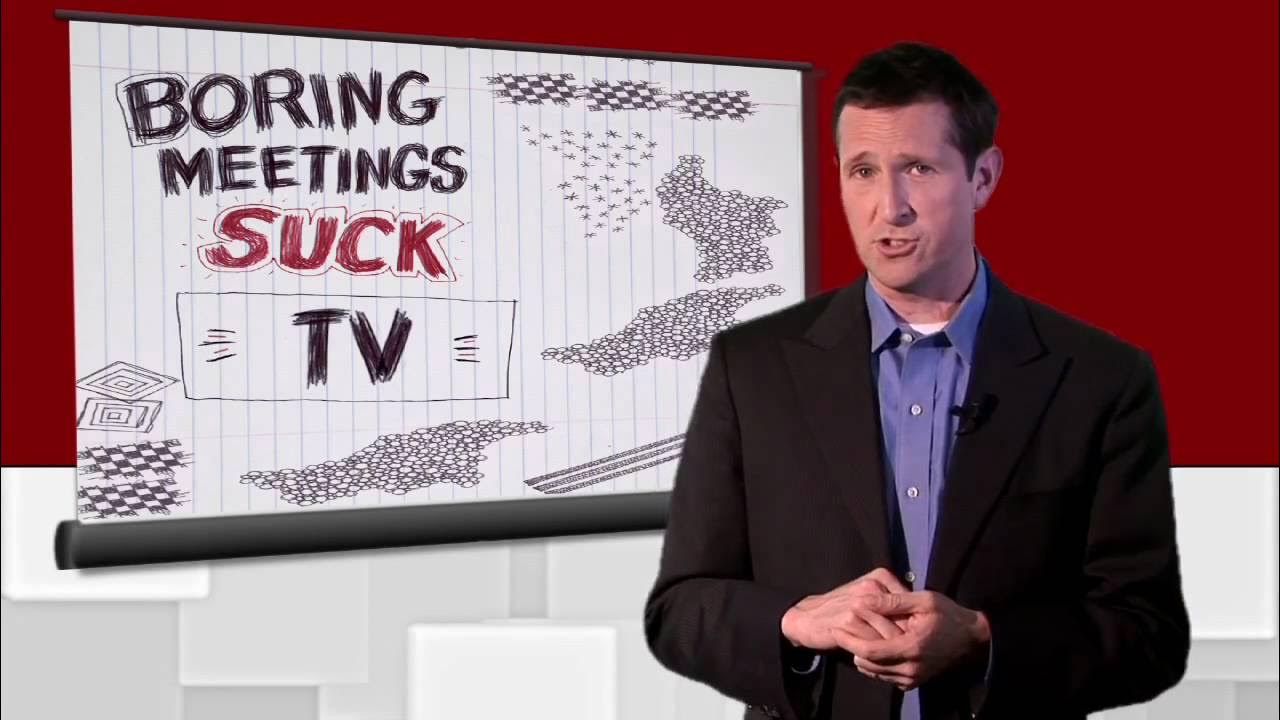STOP tangents in meetings! From "Boring Meetings Suck" author - Jon Petz
Summary
TLDRIn this video, John Pets discusses the common problem of 'tangent' discussions hijacking meetings, leading to wasted time and frustration. He suggests that when tangents arise, meeting leaders should assess whether the issue is relevant and if it requires resolution before moving forward. If it's not, attendees can be allowed to leave and be more productive elsewhere. Pets emphasizes smart time management, offering strategies like rescheduling meetings or letting participants plan elsewhere. The goal is to minimize wasted time and improve meeting efficiency, encouraging viewers to adopt more effective meeting practices.
Takeaways
- 😀 Tangents in meetings often derail the focus and waste time, leading to unproductive sessions.
- 😀 When a tangent arises, quickly assess if it’s relevant to the entire group and whether it’s a blocker to the meeting's agenda.
- 😀 If the tangent is a blocker, address it immediately, as it’s not just a tangent, but an essential issue that must be resolved.
- 😀 If the tangent isn't critical to the meeting, consider letting participants go to be productive elsewhere while the issue is addressed.
- 😀 Giving attendees the 'gift of time' by letting them leave can help them avoid wasting time when the meeting is stuck on a tangent.
- 😀 If the tangent requires substantial time or involvement, reschedule the discussion and release attendees to avoid wasting their time.
- 😀 Meetings should not hold people hostage when irrelevant discussions emerge—let them go and reschedule as necessary.
- 😀 A smart use of time involves allowing uninvolved participants to work on other tasks or even plan agenda items separately.
- 😀 For minor tangents, allow participants to take a break and regroup after a short time, such as 15 minutes, to regain focus.
- 😀 The goal is to identify and take action on what's the most efficient use of time, keeping the meeting focused and purposeful.
- 😀 The speaker promotes their book, 'Boring Meetings Suck,' for more insights on how to improve meetings in a world of short attention spans and high distractions.
Q & A
What is the primary problem addressed in the video?
-The video addresses the issue of unproductive meetings, particularly when tangents and irrelevant discussions derail the meeting's focus and objectives.
How does the speaker suggest handling tangents in meetings?
-The speaker suggests identifying whether the tangent is relevant to the group's goals. If it is relevant and crucial to the discussion, it should be addressed immediately. If not, the meeting should continue without getting sidetracked.
What is a 'suckification reduction device'?
-A 'suckification reduction device' is a strategy or tool aimed at reducing wasted time in meetings, ensuring discussions stay on track and attendees' time is used efficiently.
What does the speaker mean by 'giving attendees the gift of time'?
-The speaker refers to allowing attendees to leave the meeting if they are not needed for the ongoing discussion, enabling them to be productive elsewhere instead of wasting time in a meeting that has become unproductive.
When should a meeting be rescheduled according to the speaker?
-A meeting should be rescheduled if a key issue or tangent requires considerable time to address, and it’s clear that continuing with the agenda would not be possible or productive.
What is the speaker's advice on how to manage unproductive participants in the meeting?
-The speaker advises that if certain attendees are not involved in the ongoing discussion, they should be allowed to leave the meeting or be given other tasks, rather than staying and wasting their time.
How does the speaker suggest handling a meeting that is about to lose focus?
-The speaker suggests allowing the meeting to break for 15 minutes if necessary, to allow participants to regroup, and then reconvene to address the main agenda items.
What is the ultimate goal of the strategies discussed in the video?
-The ultimate goal is to maximize the productivity and efficiency of meetings, ensuring that participants stay focused, time is well-spent, and the meeting's objectives are achieved.
What is meant by a 'meeting stopper'?
-A 'meeting stopper' refers to an issue or discussion that completely halts the progress of the meeting, either because it is crucial and needs resolution or because it is a significant tangent that derails the meeting.
What does the speaker recommend for dealing with an issue that becomes a stopper during a meeting?
-The speaker recommends addressing the stopper immediately if it is crucial, or if it will take considerable time, the meeting should be rescheduled, and other participants should be freed to use their time more productively.
Outlines

此内容仅限付费用户访问。 请升级后访问。
立即升级Mindmap

此内容仅限付费用户访问。 请升级后访问。
立即升级Keywords

此内容仅限付费用户访问。 请升级后访问。
立即升级Highlights

此内容仅限付费用户访问。 请升级后访问。
立即升级Transcripts

此内容仅限付费用户访问。 请升级后访问。
立即升级浏览更多相关视频

How to start a meeting on time - every time. Jon Petz, Author, Boring Meetings Suck TV

Our Terrible Future And Open Source | Prime Reacts

Pengelolaan Rapat / Pertemuan || Manajemen Perkantoran - Fase F

Stop Wasting Your Time Learning to Code - FULL GUIDE

Common Mistakes Made By Newly Promoted Leaders

Handling complaint
5.0 / 5 (0 votes)
